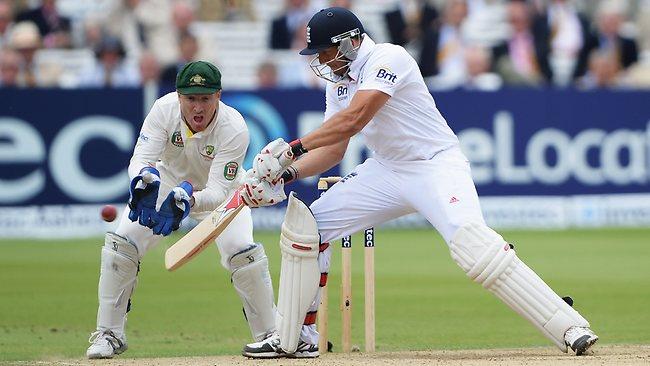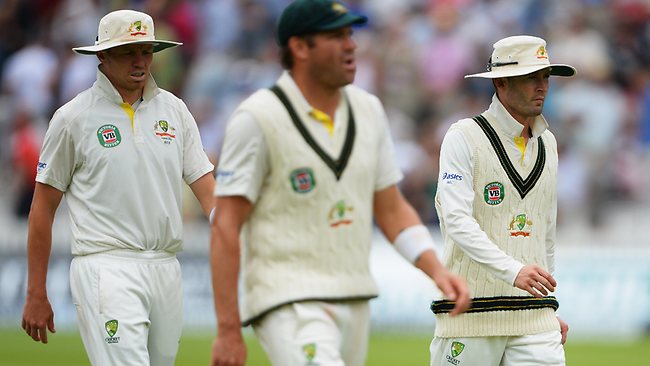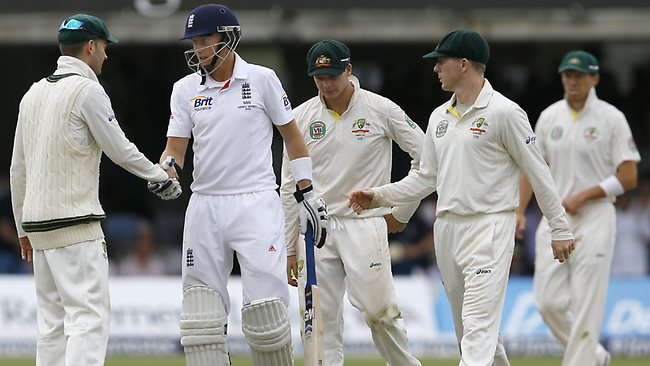England's payback at The Ashes for years of hurt
A JAUNTY trot was probably not one of the traits that persuaded the Australian selectors to recall Brad Haddin to the Ashes fold.

A JAUNTY trot was probably not one of the traits that persuaded the Australian selectors to recall Brad Haddin to the Ashes fold.
Kidology is a prerequisite for any Test wicket-keeper, particularly an Australian one in these straitened days. But Haddin's attempts to lift his downtrodden teammates against all the odds has bordered on the heroic here at Lord's.
Trot, trot, up and down, over after over. Boys, there's another wicket coming, next over. Or maybe the one after.
Another? By tea, Australia had managed just the one for the day, Bresnan, the nightwatchman. Yet Haddin duly trotted back out after tea, eager for the fray once more, seemingly oblivious to the scoreboard which showed England heading into the distance and Australia bound for ignominy. A sixth successive defeat would be Australia's worst run since a demolition by the West Indies nearly 30 years ago; a seventh, at Old Trafford, would rewind history all the way back to the nineteenth century.
Even before the Ashes began, there was widespread talk of this being the worst Australian cricket team of all time, a view that required some revision after the narrow squeak of Trent Bridge. If they were not the best, at least they showed some ticker. Then came Friday's surrender, variously described in the Australian press as "mindless", "a shambles", "amateur hour", "a mess" (that was just one writer), and a recall of the jury.
Online verdicts ranged from damning to laconic. "This carnage is too hard to watch," wrote Joseph. "I'm switching over to Saving Private Ryan for something more pleasant." "Why are these guys getting paid? Any other profession and you would be shown the door," added JA from Clontarf, NSW.
Snake from Bendigo thought Mickey Arthur, the head coach sacked just before the start of the Ashes, should drop his lawsuit and thank his former masters for their "timely decision-making". Names of potential saviours did not lift Aussie spirits much: Doolan, Paine, Wade, Voges, Maddinson, Katich, Marsh. "Mitch Marsh? He averages 21 in first-class cricket. Enough said," came the reply. And the banished David Warner? He's just made 6 and 11 against a Zimbabwean XI.
You can tell when a team is struggling: players presumed retired unretire themselves. Sadly, not Ricky Ponting or Shane Warne, but Simon Katich, who burnt most of his boats after losing his central contract and launching a forthright attack on Cricket Australia. Katich was not a good enough player to warrant much forgiveness, particularly not by a team captained by Michael Clarke, who he once famously pinned against the dressing-room wall, but the crab-like Katich is now looking a better bet than most in Australia's top order.
There was little respite for Australia yesterday. Lord's was subdued, aware that this was payback time for years of hurt, yet yearning for a sterner contest. As is his way, Clarke shuffled his bowlers restlessly, Harris for Siddle, Pattinson for Watson, Smith, Agar, Pavilion End, Nursery End; nothing could disturb Root and when a team is down it's not just their supporters who put in the boot. Some higher law kicks in too. Bell edges to gully and Smith's catch is disallowed; Root plays a rare false shot and the ball drops between two fielders, and, on Friday, Siddle splays Bairstow's stumps and replays detect a no ball. That the fragility of the Australians should be exposed by Graeme Swann and Jimmy Anderson is no surprise; that they should suffer death by DRS is more of a shock.
No one has researched the psychology of the Decision Review System. Australia's confidence has been undermined by the process. Watson was not honest with himself when he queried his lbw just before lunch on Friday, and his partner Chris Rogers, still a new boy in the side, did not help him from the other end. With Clarke still to come, Rogers did not have the confidence to review his own lbw decision, from a high full toss, which would have reprieved him, and Usman Khawaja, also a relative rookie, shrugged his shoulders as if to say: "Your call, mate'. It doesn't help that the Australians have less than full confidence in the accuracy of Hot Spot: Clarke at Trent Bridge and Phil Hughes here have reviewed catches behind the wicket and left the field shaking their heads when the decision has gone against them. It is hard enough playing a rampant, experienced, England side without the technology working against you too.
In contrast, England have worked the system well, helped by the emotionless nature of their captain. It would be interesting to speculate how the Australian team of Waugh, Warne and McGrath would have treated DRS. With professionalism, searing honesty and, for all the giant egos in the dressing-room, with a lack of ego. The DRS system was designed to help the umpires and reassure the players, but it seems to be undermining both and playing far too profound a part in the psychology of the game.
There seems no way out of the mess now for Australia, who began the day hoping that if Siddle could carry on from the previous evening when he had taken all three England wickets, or Ryan Harris could discover the zip of the first innings, some semblance of respectability could be extracted from a bleak long-term forecast. Darren Lehmann, who by all accounts delivered his first blast at his new team on Friday night, would have sent them out full of positivity yesterday morning. By the end of a cruel day, Australia were left clinging to the hope expressed by Dean from Sydney. "Let the Poms bat for as long as they can. They might enjoy themselves so much they'll forget to declare and there is a slight chance we can hold out for a draw."
England did enjoy themselves hugely, so much so that they did refuse to declare. When Root took to hitting sixes and England's lead soared past 550, the spring at last began to drain from Haddin's step.





